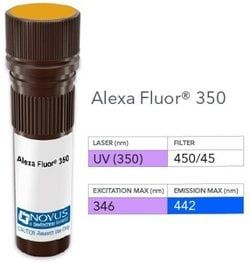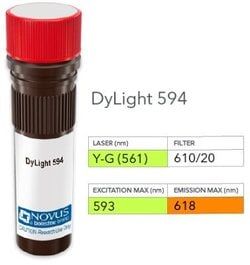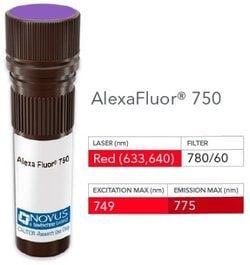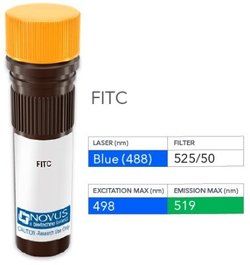Cytokeratin, LMW Antibody (AE-1), DyLight 594, Novus Biologicals™
Manufacturer: Novus Biologicals
Select a Size
| Pack Size | SKU | Availability | Price |
|---|---|---|---|
| Each of 1 | NB005748-Each-of-1 | In Stock | ₹ 57,494.00 |
NB005748 - Each of 1
In Stock
Quantity
1
Base Price: ₹ 57,494.00
GST (18%): ₹ 10,348.92
Total Price: ₹ 67,842.92
Antigen
Cytokeratin, LMW
Classification
Monoclonal
Conjugate
DyLight 594
Formulation
50mM Sodium Borate with 0.05% Sodium Azide
Gene Symbols
KRT77
Immunogen
Human epidermal keratin (Uniprot: Q7Z794)
Quantity
0.1 mL
Primary or Secondary
Primary
Target Species
Human, Mouse, Rat, Bovine, Canine, Chicken, Primate, Rabbit
Isotype
IgG1 κ
Applications
Western Blot, Flow Cytometry, ELISA, Immunohistochemistry, Immunocytochemistry, Immunofluorescence, Immunohistochemistry (Paraffin)
Clone
AE-1
Dilution
Western Blot, Flow Cytometry, ELISA, Immunohistochemistry, Immunocytochemistry/Immunofluorescence, Immunohistochemistry-Paraffin, Immunohistochemistry-Frozen
Gene Alias
Cytokeratin LMW, cytokeratin-1B, keratin 77, keratin, type II cytoskeletal 1b, KRT77, type-II keratin Kb39
Host Species
Mouse
Purification Method
Protein A or G purified
Regulatory Status
RUO
Test Specificity
This monoclonal antibody recognizes the 56.5kDa (CK10); 50kDa (CK14); 50kDa (CK15); 48kDa (CK16); 40kDa (CK19) keratins of the acidic (Type I or LMW) subfamily. Twenty human keratins are resolved with two-dimensional gel electrophoresis into acidic (pI, 48, 46, 45, and 40kDa. monoclonal antibody AE3 recognizes the 65-67, 64, 59, 58, 56, and 52kDa keratins of basic subfamily. Many studies have shown the usefulness of keratins as markers in cancer research and tumor diagnosis. AE1/AE3 is a broad spectrum anti pan-keratin antibody cocktail, which differentiates epithelial tumors from non-epithelial tumors e.g. squamous vs. adenocarcinoma of the lung, liver carcinoma, breast cancer, and esophageal cancer.
Content And Storage
Store at 4°C in the dark.
Related Products
Description
- Cytokeratin, LMW Monoclonal specifically detects Cytokeratin, LMW in Human, Mouse, Rat, Bovine, Canine, Chicken, Monkey, Rabbit, Reptile samples
- It is validated for Western Blot, Flow Cytometry, Immunohistochemistry, Immunocytochemistry/Immunofluorescence, Immunohistochemistry-Paraffin.




